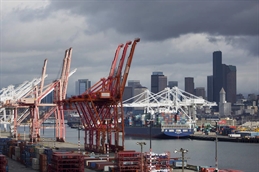
The Northwest Seaport Alliance (NWSA) — composed of seaports of Seattle and Tacoma — said its full-year 2021 volumes improved 12.5% to 3,736,206 twenty-foot equivalent units (TEUs) driven by the continued expansion of consumer demand.
In a statement, it said full imports grew 16.8% and full exports declined 12.5% for the period.
"Full imports were fueled by strong consumer demand, while full exports were impacted by a shortage of equipment and space," NWSA added.
For December 2021 alone, NWSA noted that it handled 254,102 TEUs, a 15.8% decrease from the same month last year. Full imports declined 20.6%, while full exports decreased 36.3%.
It said the December volume decline can be partially attributed to weather-related terminal closures.
Projects at NWSA
NWSA said Terminal 5 (T5), in the Seattle Harbor, re-opened for business this month with the arrival of the MSC Monterey while completion of Phase One of the T5 Modernization Project also adds berth and terminal capacity to the gateway while expanding our big-ship handling capabilities.
"The newly modernized terminal features on-dock rail, shore power, a reconfigured berth, four new super-post Panamax cranes, and additional reefer plugs," it added.
Meanwhile, for the period, NWSA said domestic volumes grew 8.7% compared to 2020. Alaska volumes increased 5.6% while Hawaii volumes grew 22.8%.
Breakbulk record
NWSA also noted that its breakbulk saw "record" volumes for the period.
It said total breakbulk grew 25.6% over 2020 volume to 366,184 metric tons. NWSA-operated terminals (EB1, Blair, and Terminal 7) handled 238,714 metric tons, surpassing the previous record (237,098 metric tons) handled in 2012.
The port noted that strong volumes were driven by unprecedented container rates and supply chain congestion, which caused shippers to utilize ro-ro vessels.
NWSA also saw auto volumes were 162,484 units, up 4% over 2020.




